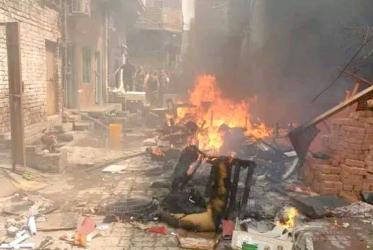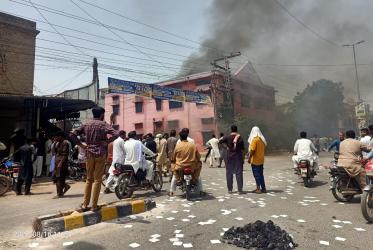1. Conscious of the way that Christians and Muslims have lived in harmony in many times and places, it is with regret that it now seems that the Blasphemy Law in Pakistan has become a major source of victimization and persecution of minorities. Since the penal code of the country was amended in 1986, religious minorities in the country have been living in a state of fear and terror. Under the Blasphemy Law false cases have been brought against religious minorities and Christians in particular have become targets of harassments and persecutions. Due to an increasing trend of the use of the Blasphemy Law, which is often being used as a tool to settle personal scores, attacks on religious minorities have been exacerbated. These incidents have fostered a climate of religiously motivated violence and persecution in several parts of Pakistan. The Blasphemy Law has become a source of friction between the country’s majority and minority religious communities.
2. The subject law is part of the penal code of Pakistan. Its Chapter XV deals with offences relating to religion, which contains sections 295 to 298. The Blasphemy Law was originally introduced during the British rule in undivided India in 1860. In 1927, section 295 was added to the penal code to deal with “deliberate and malicious acts intended to outrage religious feelings of any class by insulting its religion or religious belief”. Under this provision, protection was given to all religious groups on an equal basis. Conviction depended on proof that the accused deliberately or intentionally acted to injure or insult a person’s religious feelings. Since the founding of Pakistan in 1947, for forty years the then existing Blasphemy Law was considered adequate and no government during that period felt the need for any changes until General Zia Ul Haq introduced a number of amendments to the Pakistan penal code at the behest of the Islamic parties in the country. The change in the orientation of the state’s polices introduced by General Zia Ul Haq provided an opening to foster intolerance under the label of blasphemy. Since then, the minority Christians in Pakistan have increasingly become victims of humiliation and persecutions through false allegations made under the Blasphemy Law.
3. The Blasphemy Law, while purporting to protect Islam and religious sensitivities of the Muslim majority, are vaguely formulated and arbitrarily enforced by the police and judiciary in a way which amounts to harassment and persecution. It has become one of the most stringent laws in the country. As the law itself provides only a vague definition of blasphemy, yet blasphemy carries a mandatory death sentence in some cases. There are also serious flaws in the mechanisms to implement the law. Since the mandatory death sentence was introduced as a result of Amendment Act No. III (1986) to section 295C, many innocent people have lost their lives. In several cases, accused persons have not been brought to trial. Many victims of the Blasphemy Law have had to seek asylum in countries abroad for their security and others are forced to live in hiding.
4. The major flaw in the practice and implementation of the Blasphemy Law today is that on the testimony of a complainant, a person charged with blasphemy is immediately placed in detention. The penalty includes a mandatory death sentence for defaming the Prophet Mohammad and life imprisonment for desecrating the Holy Quran. Under the provisions of the present law, conviction is made possible without proof of deliberate attempt on the part of the accused. This is a violation of the fundamental rights guaranteed by the constitution of Pakistan. The common experience of abusing and misusing of the Blasphemy Law in Pakistan has led to physical violence, damage, destruction of properties and loss of life within the innocent Christian minority over the years. It has been reported, for instance, that between 1988 and 2005, the authorities in Pakistan charged 647 people under the Blasphemy Law. In recent times, the number has been increasing. Human rights groups observed that charges brought against individuals under the Blasphemy Law are founded solely on the individual’s minority religious beliefs or unfounded malicious accusations stemming from personal enmity, often with the motivation to have people imprisoned to gain advantage in business or land disputes. It has been reported that the judiciary also faces threats, intimidation and pressure. As a result of this, the lower courts have often been constrained to convict persons without proper study of the evidence placed before them. It is increasingly becoming difficult to obtain a fair hearing in Pakistan for those charged under the Blasphemy Law.
5. The World Council of Churches (WCC) has followed with concern the killings of Christians in Gojra and other places in the state of Punjab in the past weeks. Recalling the assurances given to the religious minorities by Mohammed Ali Jinnah, the founder of Pakistan, that “minorities are a sacred trust of Pakistan”, the WCC believes that the discrimination and attacks targeted against religious minorities in Pakistan are in violation of Article 36 of the Constitution of Pakistan that guarantees the legitimate rights of minorities. As the increasing trend of the misuse of Blasphemy Law intensifies communal hatred, religious intolerance and persecution against religious minorities, in this context the WCC expresses its serious concern on section 295C of the Pakistan penal code which carries a mandatory death penalty for anyone found guilty of blasphemy.
The central committee of the WCC, meeting in Geneva, 26 August - 2 September 2009, therefore:
A. Urges the government of Pakistan to repeal the section 295C of the Pakistan penal code which carries a mandatory death penalty for anyone found guilty of blasphemy.
B. Calls upon the government of Pakistan to guarantee the rights of all religious minorities in the country.
C. Expresses solidarity with the Christians and all other religious minorities in Pakistan.
D. Encourages WCC member churches to request their respective governments to write to the government of Pakistan and express their concerns on the security of religious minorities in Pakistan and also to request that misuse of the Blasphemy Law be stopped.
E. Calls upon WCC member churches to pray for the people of Pakistan and that peace and security will prevail throughout Pakistan.
The following prayer is offered as a resource to enable the churches’ engagement with the issue articulated above:
Holy God,
hear the cries of all
who call out your name in faith and hope
who whisper your name because of persecution and fear
who shout your name in the struggle for justice
who articulate your name in dialogue with people of other faiths
who offer your name in the search for peace and reconciliation.
Hear our cry as we call out to you, ‘Abba, Father, Holy one.’

